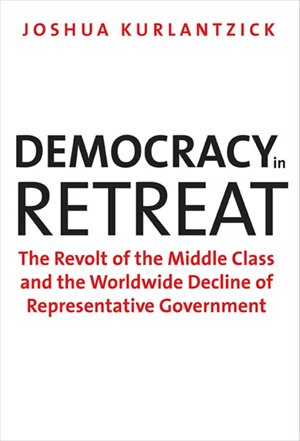Challenging long-held assumptions of democracy's certain triumph

Since the end of the Cold War, most political theorists have assumed that as nations develop economically, they will also become more democratic - especially if a vibrant middle class takes root. The triumph of democracy, once limited to a tiny number of nations and now spreading across the globe, has been considered largely inevitable.
Yet in the past decade, democracy has seen unexpected reversals around the world. Nations once held up as model new democracies have curtailed social, economic, and political freedoms. Military coups are on the rise, democratic governments have weakened and descended into chaos, and authoritarian regimes have become more repressive. The number of democracies has fallen, and the quality of democracy has deteriorated in many previously progressing nations, including several critical regional powers.
The book Democracy in Retreat, to be published in March by Yale University Press and written by Joshua Kurlantzick, a fellow at the Council on Foreign Relations, documents this disturbing trend, identifies surprising forces that threaten democracy, and warns that conventional wisdom has blinded world leaders to a very real crisis.
The book pays particular attention to the revolt of middle-class citizens, traditionally proponents of reform, who've turned against democracy in countries and regions like Thailand, Venezuela, Pakistan, the Philippines and Taiwan, and who've lost faith in democracy's promise in other countries and regions.
This move away from democratic principles by the middle class challenges a key assumption that undergirds much of US foreign policy, and is a dramatic development that must be reckoned with.
Drawing on extensive research as well as on-the-ground reporting, Kurlantzick presents a troubling new global overview of the democratic rollback and scrutinizes its underlying causes.
He then outlines concrete prescriptions for supporting democracy at this momentous juncture, including steps to prevent the disillusionment of the middle class, ways to foil elected autocrats who embrace the mechanisms of democracy but not its principles, and ideas for preventing economic stagnation and corruption, which undermine faith in democracy.
He urges thorough reconsideration of the ways that provide aid for new democracies, assess their progress, and support nations in transition to prevent regression to authoritarian rule.
The consequences of widespread democratic decline are very real: less freedom and more repression in the daily lives of millions of citizens of developing nations, and a less secure world for all of us.
Most US politicians and policymakers, Kurlantzick warns, still consider the troubling events of the past decade to be a blip in democracy's ultimate conquest. Democracy in Retreat overturns such assumptions and removes the blinders so we can move forward in ways that promote democracy more effectively.